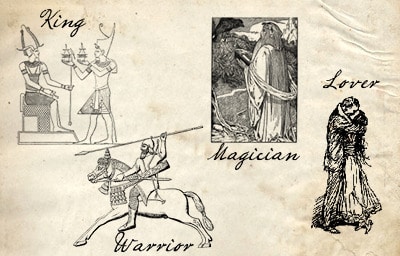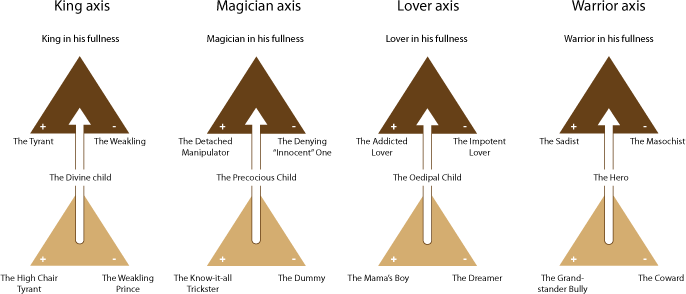Scan barcode
softmage_fromba's review
4.0
I do not agree with 100% of things written here but some sections were really interesting and thought provoking and I actually recommend this book even if its a bit outdated. Not only for men, women as well since I believe this arquetypes live in all of us.
dennisbnlc's review
informative
reflective
relaxing
medium-paced
3.25
It was an interesting examination of what could be considered the internal "male" landscape through the lens of Jungian psychology.
donatasd's review
4.0
The book provides structured distinction of 4 archetypes of masculine psyche: the King, the Warrior, the Magician and the Lover. It covers the historical and religious development of the archetypes, their positive and negative manifestations in everyday life. Good and insightful content, however not an easy read full of interpretations and allegories.
jkanz's review
5.0
This ought to be required reading for any male organization, male private schools, male boarding schools and why stop there, it’s a highly informative book not only for the male gender but for all along the gender spectrum. This book will help us realize the root and base of our interactions. Why we act the way we do and fail to act in ways we ought. I truly had to let myself be immersed and dissect it page for page in my continual journey to create the mature masculine within myself.
sergek94's review
3.0

“Often, conducting a dialogue with inner “opponents”—usually forms of the immature masculine energies—will defuse much of their power. What they—like all children—really want is to be noticed, honored, and taken seriously. And they have a right to be. Once they are honored, and their feelings validated, they no longer need to act out through our lives.”
Jungian psychology has interested me for a long time, and I've had this book in my TBR for a long while, and I'm glad I've finally come around to reading it. The notion of archetypes is a very underrated one in modern psychology, in my opinion, and that is largely due to the fact that it is quite an intangible and abstract concept that is pretty far from the scientific method which modern fields prefer. However, there truly is value to this field if one is willing to give it a try.
Archetypes are general behavioural patterns that have become their own distinct personalities, which we see repeating themselves and being expressed through human beings and through historical events for millennia. We see these archetypes everywhere, when we go out with our friends and notice these behavioural patterns within them, when we open the news and notice those archetypes in our world leaders and even in the general public reacting to world events, when we read any fiction book and see these archetypes being reflected over and over again through characters, and also when we look deep into ourselves and our own motivations. These archetypes exist as their own mental entities, and are finite reincarnations expressed through an infinite potential of human reproduction.

This book specifically explores the male archetypes which, according to the author, every male has within. The just and authoritative and controlled King, the fierce and powerful and courageous Warrior, the intellectual and intelligent and sharp Magician and the sensual, compassionate and warm Lover. Each of these "masculine archetypes" are carry-overs of the corresponding "boy" archetypes, and according to the author, many adult men never evolve from those boy archetypes.
Published in 1991, this book is inevitably painted through a very traditional gender-role lens, with men painted as being meant to take on certain social roles that women are not, though this is implied instead of explicitly said. In addition, there is a large lack of LGBT perspectives being represented, which will leave out or negatively impact a large segment of the population reading this book, who might not relate to these very stereotypical masculine take on the archetypes, though as I've said earlier, that is to be expected from a book published during that time. These aspects make the book a little less relatable and slightly outdated through the lens of modern society, which has gone through radical shifts in the 21st century, especially in terms of liberation of sexual orientation and gender expression, as well as the recognition of non-traditional relationship styles. At one point, this book subtly establishes monogamy as a "norm" or as a sign of "maturity and being grounded" which might not sit well with people who prefer non-monogamous relationships.
“We want to show men how they can access these positive archetypal potentials for their own benefit and for the benefit of all those around them, maybe even for the planet.”
Aside from these inevitable traditional values painting the lens of these ideas, the content here is pretty interesting and decent, and also pertinent to our everyday lives. It is very likely that the reader will find themselves and/or people they know in these described archetypes. I was about to be left disappointed at the lack of "practical" instruction on how to practice integrating these archetypes, but they were thankfully explored at the end of the book.
To end this review with an amusing quote from the book:
"But it isn't just the lack of a vision that signifies the oppressive
power of the Impotent Lover in a man's life. It is also the absence of an
erect and eager penis."
This is a decent short read and I do recommend it, since I think exploring these archetypes is something most people would benefit from. If there's a take on the "female archetypes", I would also like to read it in the future.